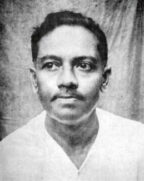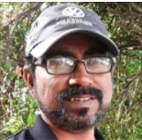It is an important occasion for all of us at The Antonym today. It is the International Translation Day! To mark this occasion, we have been celebrating Translation Month throughout the month of September. As a part of that, a competition was announced wherein submissions were requested for translations of three poems from one’s mother tongue to English. We received an overwhelming number of submissions and we are happy to announce that we have chosen the four best entries! The following set of three poems by Jibanananda Das, originally written in Bengali, and translated to English by Moulinath Goswami, is one among the selected entries.
Translated from the Bengali by Moulinath Goswami
Banalata Sen
Been trudging the earth for a thousand years,
from the Ceylonese sea into the nocturnal waters of Malaya
much have I traveled; in the hoary realm of Ashoka Bimbisara
there I was; dwelt deep in the dark of distant Vidharbha
A tired soul was I, round me the frothing seas of life galore,
she gave me a moment’s respite—Banalata Sen of Natore.
Her hair the murk of ageless Vidisha nights
her face like Shravasti’s filigree; when tossed upon a distant sea
and lost with a failing mast a sailboater sights
amid a cinnamon isle a patch of greenish lea,
seen her thus in the dark; “Where were you?” asking all the more
lifting her nestling eyes said, Banalata Sen of Natore.
Like the sound of the creeping dew, the day retires
dusk descends; the kite sweeps the scent of the sun from its wings;
when all the colors have died, the fireflies prepare
to script a tale that from their shimmering luminance springs;
All birds come home—all seas—thus ends life’s all bargain;
Only darkness remains, and for a tête-à-tête remains Banalata Sen.
The Sprite Woman
In the thick of the darkening dusk, away from the wilderness,
whoever she was, a woman called—
I long for you, said she:
blue as the fruits of the rattan tree
I’ve searched for your wounded eyes
among the stars—in the plumes of mist—
within the luminance that from the fireflies trickle
in the evening river—I’ve looked for thee there—
Wings spread like a gray owl in the autumnal dark
gliding past terraces of paddy
in golden stairs of endless corn and corn,
have I searched you with the soul of an owl forlorn?
Decked she was in the pallid colors of a morose bird
that soaked in the evening murk perches atop the fry-wood tree—
above whose head looms the crescent,
whose voice the curving horn of the sliver listens.
Her face as white as the cowrie,
her hands are cold;
red as the burning oak her eyes gleam
like a blazing pyre; southward lies her sprite head
as if, alas, scorching in her own inferno!
As if in her eyes
the bluish darkness of a hundred centuries;
her breasts
like those of the primeval woman—
pale as a conch—moist with milk!
The world bears her once, and then never ever.
A Day Eight Years Ago
Heard they had taken him to the morgue,
last night—in the thick of the night of spring
when the waxing crescent had set
he fancied dying.
The wife slept beside him—the child was there too
there was love, there was hope—
yet, what ghost did he see in the moonlight?
What shook him from his rest?
Or perhaps he hadn’t slept for ages—
Thus lying in the morgue he now sleeps.
Was this his coveted slumber?
Lying on his face, blood and froth
like a plagued rat with a mangled neck
in the dark dungeon now he sleeps;
Never to rise again.
“Never to rise again, never bear
the labor of staying awake
and its recurring ardor”—
And so a silence spoke, creeping up to his window
with the stealth of a camel’s nape
when the moon had died in the amazing dark.
Yet the owl stays up;
The wilted frog begs for a few moments more
sensing the warmth of another impending dawn.
I realize, in the profound unknown of the gregarious darkness
around me hangs the ruthless defiance of a mosquito net;
From the comfort of their colonies mosquitoes stay awake in the murk,
loving the gregarious stream of life.
From its weary blood perch, the housefly again flies towards the sun;
So many times have I seen the flying insects dance
in the golden ripples of sunlight.
The intimate sky—like some pervasive life dominates their hearts;
the trembling dragonfly grappled with death
at the hands of an enfant terrible;
When the moon had waned in the leading dark,
you still walked up to the holy fig with a rope in hand;
knowing only very well, lives of grasshoppers and robins—
never come to terms with that of a man.
Didn’t the holy fig branch protest?
Didn’t the fireflies hobnob with the bunch of tender golden blossoms?
Didn’t the decrepit blind owl come and say:
“Has the haggish moon been swept off by the flooding waters?
Excellent!—
Let us now catch a mouse or two!”
Didn’t the owl come and herald this tumultuous bulletin?
This taste of life—this ripe barley fragrant autumn evening
seemed unbearable to you;
With gore on your lips, lying like a battered rat,
did the morgue—the sultry morgue soothe your heart?
Yet listen to the tale of this dead;
no trace of unrequited love anywhere;
fancies of marital life did leave no dregs of regret;
Rising above the call of the hour
the wife did let him savor
the elixir of thought—and nectar;
Throes of winter did not bring
shivers of slander in his gluttonous life;
Hence in the mortuary here he lies,
lying on his back atop the table.
I know—I still know
A woman’s heart—love—child—house—is not all;
nor wealth, nor deed, nor affluence—
but some endangered wonderment
plays deep inside our inherent blood;
It exhausts us—
tires—tires us;
Inside the morgue that languor isn’t there;
So
there he lies,
lying on his back atop the table.
Yet, each night I see
from its perch on the holy fig tree
the decrepit blind owl rolls its eyes and says:
“Has the haggish moon been swept off by the flooding waters?
Excellent!—
Let us now catch a mouse or two—”
Oh, my profound foremother—excellent, even this day?
I too shall age like you one day—
I’ll sweep the old lady moon across the brackish flood waters;
And we both shall walk away emptying the life’s ample coffers.
Also, read other winning entries for Translation Month, published in The Antonym:
Follow The Antonym’s Facebook page and Instagram account for more content and interesting updates.
Also, please join The Antonym Global Translators’ Community Facebook group to stay engaged in interesting conversations about everything that concerns translations!



























I have so much gratitude for these translations. Magnificent. “….the fireflies prepare to script a tale that from their shimmering luminance springs….”
Thanks for your words of appreciation… inspiring for a translator.
Regards
Moulinath Goswami.
Thanks for your words of appreciation… inspiring for a translator…
Regards
Moulinath Goswami